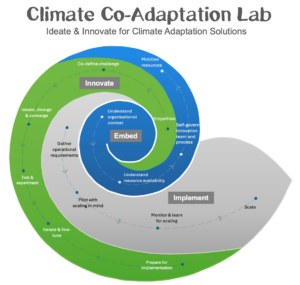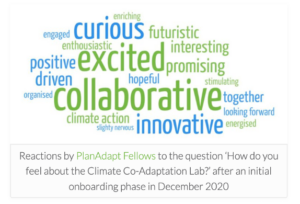What Have We Learnt from over Three Years of Facilitating the Climate Co-Adaptation Lab, our Co-Creation & Innovation Space for Climate Adaptation Solutions and Climate Risk Management?
Lessons and insights by the Coordination Hub of PlanAdapt, i.e. the conveners and facilitators of this collective approach to CCA and CRM-focused learning and innovation
Pohhhhh, what a whirl-wind experience that has been, since we launched the Climate Co-Adaptation Lab in December 2020. Internally, we call our space ‘the Lab’ for short. Joy, respect, humility, thrill… but also pain, long hours of work, frustration and uncertainty (particularly in view of financial survival). All of this was part of an incredibly rich journey during the last three and a half years.

We wanted to test and experiment with new ways of collaborating, innovating, learning, and networking. Clearly, this adds a new element to the landscape and the purpose of organisations working on this ‘new’ societal mega-challenge, adapting to the impacts of climate change. According to IPCC WG II 2023, at least 3.3 billion people live in contexts that are highly vulnerable to climate change. Even the sheer scope of the challenges calls for new approaches to innovating and engaging, as well as scaling up ambition.
We know that there are plenty of creative and experimental ways to co-create and innovate regarding CCA and CRM out there. Some of them are called labs, multi-stakeholder platforms, alliances, etc. What they all have in common is an ethos of collaboration, a diverse range of stakeholders, sharing of ideas, trust-building, learning from lived experiences and exploring together.
Labs are also potential spaces for transdisciplinary experimentation, while engaging societal stakeholders around real-world complex problems. While the aim of a Lab can be to problem-solve, the process of defining the problem from multiple perspectives, especially non-expert or non-academic, is equally important and regarded as a critical dimension towards creating change.
Labs also hold the potential to empower stakeholders, equipping lab participants with new knowledge, new relations, and new competencies. Labs aim to ultimately build capacities towards creating societal change by create safe spaces for ideation, experimentation and testing of ideas over a longer timeframe, with regularity, consistency and reliability (Kok et al. 2023, Pereira et al. 2019). Examples of Labs, that are concerned with climate and environmental aspects: African Cities Lab, Urban Nature Labs, FRACTAL Learning Labs, CLARITY Transformation T-Labs, UNDP Accelerator Labs, C3 Labs.
We want to share our insights and lessons with others who convene, curate and facilitate such spaces. We have, of course, an overview of the more rigid data in view of results and the impact that we collectively achieved, using indicators such as ‘number of CCA & CRM concepts & innovations developed’; ‘number of Lab participants that enhanced their innovation potential and deepened their knowledge about CCA & CRM solutions’ etc. These are measuring the external, real-world effects; however, we are equally interested to build our own capacity to facilitate such a space. The journey of PlanAdapt has been rooted in constant and iterative improvements of the approaches and modalities we employ. We know about many imperfections of the Lab, and hence, learning-as-we-go is part of the model. Somehow, a truly adaptive and collaborative endeavour!
Here are some aspects of the Climate Co-Adaptation Lab that are both, key principles and (potentially) success factors:
- the Lab participants (i.e. PlanAdapt Fellows) are semi-permanently admitted and the participants pick-and-choose when and how to get engaged in co-creation process (principle 1: self-determined and voluntary engagement). They are selected vis-a-vis criteria such as innovation potential; motivation to co-learn, share, innovate and collaborate in a diverse group; relevant previous experience relating to CCA; competencies to interact in cognitive group processes; recognition and sense of the beauty of collective wisdom (principle 2: clear admission criteria for participants);
- this collaboration and innovation space is convened, curated, and facilitated by a common resource of the ‘Lab community’, the Coordination Hub. The Lab is designed as a continuous and permanent space. This tries to overcome limitations experienced in temporary, project-funded spaces that are driven by external influences, e.g. donors and investors. The aim is to become a self-sustained Lab community based on financial benefit-sharing mechanisms and hence, remain somehow independent from external expectations (principle 3: self-sustained and independent from external pressures);
- the co-creation process, aimed at the development of climate adaptation solutions and innovations, has 4 process stages, that acknowledge that ideation and innovation processes (a) can be a self-governed process of a self-selected group of ideators and innovators framed by an incentive structure, with facilitation by a common resource (principle 4: self-governing of group processes); and (b) are ideally based on a real-world adaptation or climate risk ‘problem’ (problem-focused); and (c) outcome/ solution-focused (principle 5), but open towards the type of solution (principle 6), i.e. technological, institutional, ‘better’ knowledge and information, financial.
- innovation potential is ensured through the high level of diversity of participants (principle 7), in view of cultural, disciplinary, and sectoral backgrounds (however, all participants had previous exposure to solving problems related to climate risks);
- the output and outcome of the co-creation process is not ‘only’ knowledge, but project and service ideas linked to the ambition to move it towards up-take. Knowledge is not the end, but a vehicle (principle 8) and ingredient of adaptation solutions and innovations.
 No one is perfect and there are significant challenges that we are keen to find solutions for:
No one is perfect and there are significant challenges that we are keen to find solutions for:
- financial self-sustenance (as mentioned in point 2) works out only partially;
- cognitive diversity is essential to pursue innovation, to hear other perspectives and be exposed to new ways of thinking. But there is a trick for this: too dissimilar and not connected ideas do not result in super ideas but can lead the conversation astray. Collaboration should be focused and purposeful so that cognitive diversity can accelerate, and lead to novel insights;
- the level of comfort with self-governed and self-determined group processes among the participants differ significantly, and requires a high level of flexibility by the Lab facilitators to cater to varying expectations in view of process structure and guidance;
- fairness and transparency in equitable sharing of costs (input resources such as effort, time, intellectual property) and benefits (monetary as income generated; and non-monetary, such as learning, collective sensemaking, professional development, networking, a sense of belonging);
- how to link online co-creation and ideation with offline innovation and implementation processes;
- keeping a parallel incentive structure of monetary and non-monetary benefits that is not built on rigorous (or even contractual) agreements of sharing costs and benefits appears difficult;
- the interdependencies of design elements as represented by the principles are complex and challenging to anticipate and forecast once individual elements are modified.
The main purpose of this blog post is to find and potentially help like-minded colleagues who grapple with similar challenges in terms of convening, curating & facilitating innovation and co-creation spaces. Please do get in touch!
And to all funders and investors out there: Please get in touch if our approach speaks to you. We would be delighted to build new and exciting partnerships, and collaborate on new and creative ways of ideating and innovating for climate adaptation solutions!
We are also looking for local partners who operate in climate risk ‘hotspots’ to meaningfully link virtual ways of ideating and innovating with place-based engagement, linking individuals, communities and organisations in specifically climate-sensitive geography with the actors and the expertise in the Climate Co-Adaptation Lab.
Contact us by sending an email to engage (at) plan-adapt.org or PlanAdapt’s social media channels.
Find more similar PlanAdapt initiatives that could be of interest:

Great work